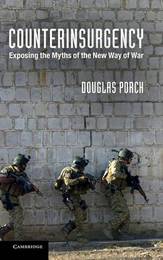
|
Counterinsurgency: Exposing the Myths of the New Way of War
Hardback
Main Details
| Title |
Counterinsurgency: Exposing the Myths of the New Way of War
|
| Authors and Contributors |
By (author) Douglas Porch
|
| Physical Properties |
| Format:Hardback | | Pages:450 | | Dimensions(mm): Height 229,Width 155 |
|
| Category/Genre | Military history |
|---|
| ISBN/Barcode |
9781107027381
|
| Classifications | Dewey:355.409 |
|---|
| Audience | | Professional & Vocational | |
|---|
| Illustrations |
7 Maps; 16 Halftones, unspecified
|
|
Publishing Details |
| Publisher |
Cambridge University Press
|
| Imprint |
Cambridge University Press
|
| Publication Date |
11 July 2013 |
| Publication Country |
United Kingdom
|
Description
Counterinsurgency has staked its claim in the new century as the new American way of war. Yet, the wars in Afghanistan and Iraq have revived a historical debate about the costs - monetary, political and moral - of operations designed to eliminate insurgents and build nations. Today's counterinsurgency proponents point to 'small wars' past to support their view that the enemy is 'biddable' if the correct tactical formulas are applied. Douglas Porch's sweeping history of counterinsurgency campaigns carried out by the three 'providential nations' of France, Britain and the United States, ranging from nineteenth-century colonial conquests to General Petraeus' 'Surge' in Iraq, challenges the contemporary mythologising of counterinsurgency as a humane way of war. The reality, he reveals, is that 'hearts and minds' has never been a recipe for lasting stability and that past counterinsurgency campaigns have succeeded not through state-building but by shattering and dividing societies while unsettling civil-military relations.
Author Biography
Douglas Porch is Distinguished Professor of National Security Affairs at the Naval Postgraduate School, Monterey, California. A specialist in military history, he advises on security issues all over the world. His most recent book, The Path to Victory: The Mediterranean Theater in World War II, received the Award for Excellence in US Army Historical Writing from The Army Historical Foundation.
Reviews'In this brilliant volume master historian Douglas Porch shatters the myth of contemporary counterinsurgency by exposing its raw historical roots. American counterinsurgents often preach moralistic sounding bromides like 'protect and serve the local populations'. Porch deconstructs the mythical universe of counterinsurgency and lays bare the historical truth that they are ultimately wars of death, destruction, and often brute conquest.' Colonel Gian Gentile, United States Military Academy, West Point 'Douglas Porch has written one of the single most outstanding reviews and critiques of the modern theory of counterinsurgency. It fully exposes the myths and legends behind a fundamentally flawed and pernicious approach to conceptualising human conflict. This book should be essential reading for military students, scholars and laymen alike.' Alex Marshall, The Scottish Centre for War Studies, University of Glasgow 'I cannot say how important I believe this book to be. You may have the usual issues with my article, but do not let these put you off this hugely significant piece of scholarship, which melds aspects of foreign and domestic policy in a very unusual way and, if the world were just and reasonable, would become an internationally acclaimed text. I hope it does because it would be little short of a tragedy if it disappeared and the West did not embrace the analysis and so change its ways for the better. It's a tough read for the British and Americans, but like all good analysis, it really can stop us making the same mistakes, generation after generation.' Henry Porter, Observer 'Provocative ... challenges the very doctrine of counterinsurgency from the late nineteenth century to the Petraeus surge in Iraq.' Total Politics 'This is a rich, well supported study of a tendentious topic ... it pulls together material on a remarkable variety of cases to make a powerful point that is valuable in the undergraduate and graduate classroom as well as for broader practitioner and public audiences.' Jacqueline L. Hazelton, H-Diplo
|